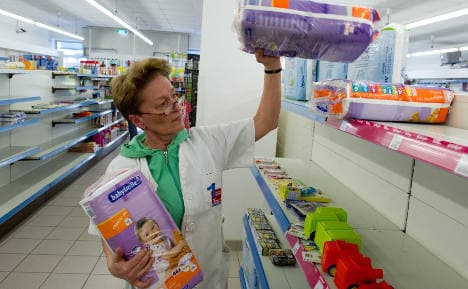'No' to help for Schlecker staff turns political

As around 10,000 workers at drugstore chain Schlecker found dismissal letters in their post boxes on Friday, Chancellor Angela Merkel’s coalition was riven by the refusal of her partner party to support a programme to help staff.
The Free Democratic Party (FDP) stymied a move for the state governments to guarantee a €70 million loan which would have been used to create a jobs-creation and retraining agency for the chain's former employees.
The temporary agency would not only have helped the Schlecker employees, but also made the remaining rump of the company more viable, by relieving it of possible claims from former workers.
Although around 2,000 of the Schlecker shops will be closed, around the same number will be kept open in Germany, with nearly 20,000 people remaining in work there.
The Bavarian state was initially in favour of guaranteeing the agency, but bailed out at the last minute, with FDP state Economy Minister Martin Zeil forcing the change of heart.
It had not been a simple decision, he said on ARD television on Friday morning, “but the decision was in fact correct.”
“It is not as if one can make the tax-payer liable for years of bad decisions in management,” he said.
He was joined by fellow FDP ministers from the states of Saxony and Lower Saxony in refusing to be part of the guarantee, the Süddeutsche Zeitung reported.
The idea was finally buried on Thursday evening, leaving the Schlecker staff on their own – and relations between Merkel’s coalition partners frosty.
Horst Seehofer, state premier of Bavaria and head of the Christian Social Union (CSU), the southern arm of Merkel’s Christian Democratic Union (CDU), was openly furious.
“It is part of us in Bavaria that we don’t leave people all on their own, but that we take a stake in their fate. That would have been possible and reasonable in this case,” he told Bavarian state TV on Thursday evening.
The FDP is struggling to carve out a space in state and national politics, with polling numbers consistently below the five percent hurdle needed to enter parliament.
The federal election is not until next September, but before then the states of Schleswig-Holstein, North Rhine-Westphalia and Lower Saxony hold their state elections.
The latest state election, in Saarland, saw the FDP wiped off the electoral map, and out of the state parliament, with just 1.2 percent of the vote.
DAPD/The Local/hc
Comments
See Also
The Free Democratic Party (FDP) stymied a move for the state governments to guarantee a €70 million loan which would have been used to create a jobs-creation and retraining agency for the chain's former employees.
The temporary agency would not only have helped the Schlecker employees, but also made the remaining rump of the company more viable, by relieving it of possible claims from former workers.
Although around 2,000 of the Schlecker shops will be closed, around the same number will be kept open in Germany, with nearly 20,000 people remaining in work there.
The Bavarian state was initially in favour of guaranteeing the agency, but bailed out at the last minute, with FDP state Economy Minister Martin Zeil forcing the change of heart.
It had not been a simple decision, he said on ARD television on Friday morning, “but the decision was in fact correct.”
“It is not as if one can make the tax-payer liable for years of bad decisions in management,” he said.
He was joined by fellow FDP ministers from the states of Saxony and Lower Saxony in refusing to be part of the guarantee, the Süddeutsche Zeitung reported.
The idea was finally buried on Thursday evening, leaving the Schlecker staff on their own – and relations between Merkel’s coalition partners frosty.
Horst Seehofer, state premier of Bavaria and head of the Christian Social Union (CSU), the southern arm of Merkel’s Christian Democratic Union (CDU), was openly furious.
“It is part of us in Bavaria that we don’t leave people all on their own, but that we take a stake in their fate. That would have been possible and reasonable in this case,” he told Bavarian state TV on Thursday evening.
The FDP is struggling to carve out a space in state and national politics, with polling numbers consistently below the five percent hurdle needed to enter parliament.
The federal election is not until next September, but before then the states of Schleswig-Holstein, North Rhine-Westphalia and Lower Saxony hold their state elections.
The latest state election, in Saarland, saw the FDP wiped off the electoral map, and out of the state parliament, with just 1.2 percent of the vote.
DAPD/The Local/hc
Join the conversation in our comments section below. Share your own views and experience and if you have a question or suggestion for our journalists then email us at [email protected].
Please keep comments civil, constructive and on topic – and make sure to read our terms of use before getting involved.
Please log in here to leave a comment.